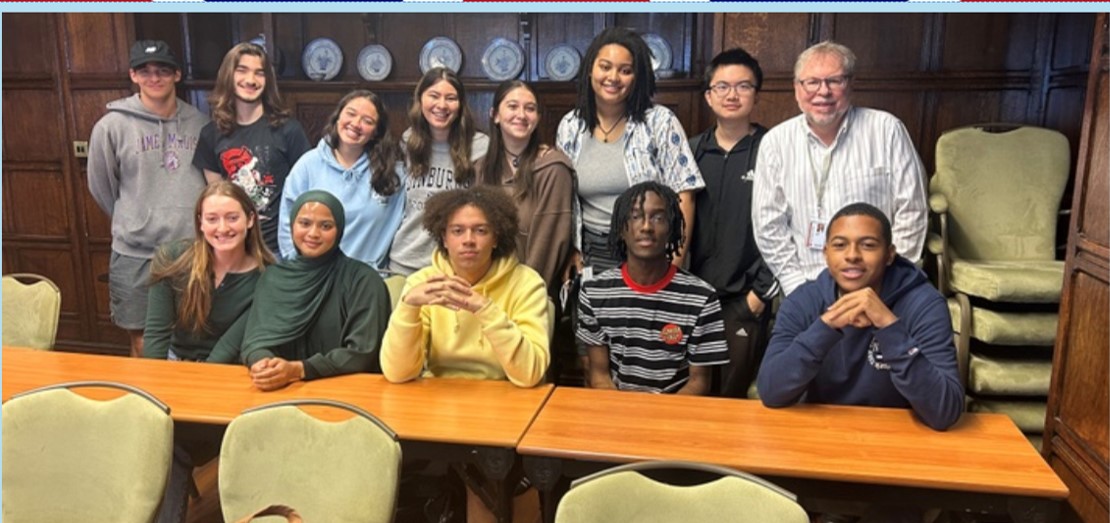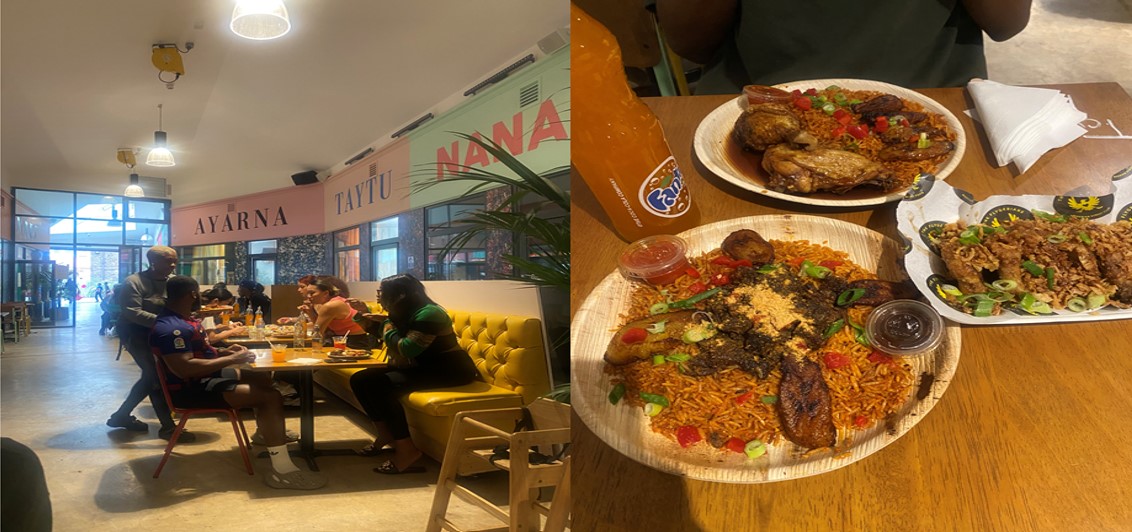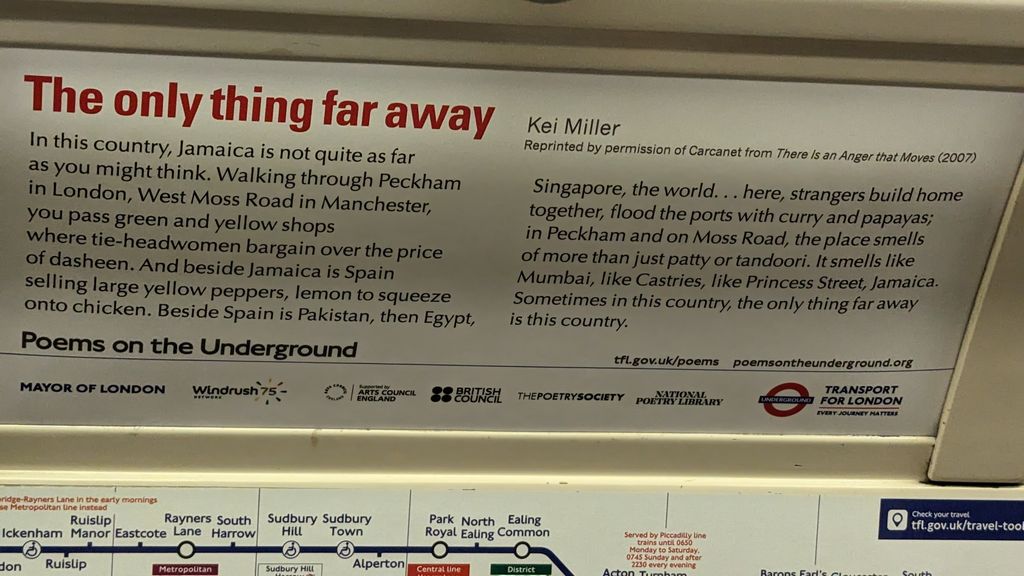CGS Syllabus: Food in London
By Gabrielle Drillis
Traveling abroad presents endless opportunities to connect with peers, explore new places, learn about different cultures, and indulge in foreign cuisines. Furthermore, students are given the opportunity to learn in a unique, hands-on environment where they are fully immersed into the content of the curriculum.
Master Lecturer John Regan took this opportunity to give his RH104: Rhetorical Practices from The Industrial Revolution through the Digital Revolution students an assignment that was both enjoyable and enabled them to learn in a creative way, challenging them to choose a restaurant in London as a means for exploring culture more broadly.

The Assignment
The ‘Food in London’ assignment consisted of a three-paragraph written assignment, focusing on motives for the chosen restaurant, the food review, the experience as a whole, and an overall rating, as well as two photographs with captions. Students were allowed to work with a partner or complete the assignment individually.
Professor Regan’s assignment is the first project students complete for RH104 during their summer semester in London. Regan designed the project to combine experiential learning and in-class concepts to help students explore London and themselves in a new way. Rather than relying solely on writing, the project asks students to combine writing with the visual element of photography to illustrate their cultural experience.
“I combined readings, experiential learning, and in-class concepts to encourage students to get out and explore,” Regan said.
Traveling abroad is an exciting experience for many students, but can also be nerve-wracking for some. Recognizing this, Regan felt it was important to create an assignment that not only kept students engaged with the principles of RH104, but encouraged them to reconnect with their culture and traditions from home.
The assignment was inspired by a project Regan piloted during the 2022 London summer semester. Students were asked to go grocery shopping and photograph their cooking journey. Understanding that college is expensive, especially when traveling abroad, Regan emphasized the importance of a low-budget shopping trip.
Regan’s expectations were far exceeded by what his students produced. Many students cooked meals that reminded them of their homes, families, or ethnic backgrounds, which helped alleviate feelings of homesickness. Some of the students reached out to family members to ask advice on how to cook a certain meal or just discuss the project in general, further bridging the distance gap.
The success of the project prompted Regan to reassign it to his new students this past summer, but with a twist. Regan wanted students to take on the role of BBC food critics who were working on a series about affordable food sites in London’s neighborhoods. Various aspects of the food were to be considered: texture, taste, presentation, aroma, and affordability.
Learning Goals
CGS RH104 expands on the knowledge gained in RH103: Rhetorical Practices from the Ancient World to Enlightenment during the spring, and places an emphasis on digital media expression and sentence-level writing skills. These primary learning objectives introduce students to photography and media as a way of exploring the modern world during the digital revolution.
Consequently, RH104 fulfills the following 3 HUB units for students: Communication (First-Year Writing Seminar), Digital and Multimedia Expression, and the Intellectual Toolkit (Critical Thinking). Each HUB unit focuses on specific skills that students obtain through the class, and the ‘Food in London’ assignment effectively helps in accomplishing that goal.
Cultural exploration is a significant aspect of the course Regan wanted his students to engage with. A primary objective of RH104 is honing in on organization, self-editing, and critical thinking skills.
Due to the nature of the abroad experience, Regan said, the best way for students to develop these attributes is through foreign immersion. Subjecting themselves to unfamiliar environments and cultures prompted students to pay particular attention to these skills and expand upon them.
‘Food in London’ also helped Regan make new discoveries. The final projects made him realize that he had been “teaching with one hand behind [his] back in the past” and that creativity is a stimulating and rewarding addition to any project.
“Rather than taking the path of least resistance, [students] went out and explored. The most rewarding part of my job is watching students grow and thrive and work toward their future. [My career] is all about them!” Regan said.
Approaching the Assignment

Lindsay Li-Garrison (’24, SAR’26) felt that the adventurous aspect of RH104 had an invaluable impact on her learning.
“I believe that incorporating assignments that required students to explore London and try different restaurants was a genius idea,” Li-Garrison said.
Li-Garrison chose to review BAO Soho, a Taiwanese fusion restaurant located in the Covent Garden area of London. Her visit to BAO Soho was the first of her many cultural food experiences in London. By the end of her six weeks, Li-Garrison discovered that each neighborhood hosted a particular form of cultural cuisine, making it easy for her to discover new foods and fall back on traditional meals that reminded her of home.
Given the project was assigned early on in the semester, she had the opportunity to try various other restaurants that her classmates reviewed as well, enhancing her abroad experience.
“I learned more about different cultures and demographics. Soho was notorious for hosting a wide variety of cuisines, whereas East London had a thriving Bangladeshi/Indian food scene,” Li-Garrison said.
Dami Akingbade (’24, Questrom’26) visited Flygerians, a Nigerian restaurant nestled in the Peckham district of London. Her choice was motivated by her cultural ties to the cuisine served at the restaurant, which aided in her being a good judge on the authenticity of the food and environment.
“My advice would be to have fun with it, explore further than South Kensington, and choose a place that truly resonates with you,” Akingbade said to future students in the course.
Eddie Brannan (’24, CAS’26) took an unconventional route to complete his project. Rather than visiting a stand-alone restaurant, he chose to review a taco stand located in the music venue Pop Brixton, which features various food vendors, retail stands, and live music shows.
“Branch out and don’t be afraid to try something new. Go to an area you haven’t visited yet and find out where the hidden food gems are hiding,” said Brannan. “I wouldn’t have explored Brixton had we not been given this assignment. We are already in a new place, it just makes sense that we should explore it independently and see what it has to offer. This assignment provided an easy incentive to check out a new place and explore a city.”
Final Grades

Reviewing the projects introduced Regan to new aspects of cultural cuisines that he had not known about before, and he said he was inspired by watching his students exceed his expectations through each phase of the assignment.
“What can be better than taking a globally diverse group of wonderfully mature people and setting them loose in London to explore?” shared Regan.
The project makes up 15 percent of the overall course grade and is evaluated based on creativity, use of course resources, and enthusiasm. Regan proudly shared that the average overall grade received by his students on the recent ‘Food in London’ assignment was the highest he has seen in his teaching career at Boston University.
“The students wrote with a lot of genuine emotion,” he said.
Akingbade said her experience at The Flygerians not only helped her complete the ‘Food in London’ assignment, but deepened her understanding of her own personal learning style and cultural ties to a foreign city.
“I learned that I work better when it’s a topic I’m really interested in and that has a close connection to me. It helped me learn more about the Nigerian culture and society in London,” she said.
She expressed that the exploratory aspect of the project added a unique element that enhanced her overall experience in London. The excursions, reflection assignments, and balance between academics and free time made Akingbade’s abroad semester both educational and exciting. If given the opportunity, she says she would “go back and do it all over again.”
“I love the fact that exploring, trying foods and discovering London was part of our homework because it made my London experience more enjoyable,” said Akingbade.
Regan said he is looking forward to seeing what his students produce for the ‘Food in London’ assignment this summer, and encourages all students to fully immerse themselves into this new experience.
“Whether you’re in Boston or London, or any other global program, don’t get stuck in your campus or tourist bubble,” he said. “Get out and explore other parts of the city you’re in.”
